Analysis of Rapid Leadership Changes in Australian Politics: A Decade
VerifiedAdded on 2020/11/23
|9
|2460
|492
Essay
AI Summary
This essay analyzes the rapid turnover of Australian prime ministers over a ten-year period, examining the leadership of Kevin Rudd, Julia Gillard, Tony Abbott, and Malcolm Turnbull. It explores the factors contributing to this political instability, including internal party conflicts, policy decisions, and public opinion. The essay further investigates the impact of these frequent leadership changes on contemporary Australian politics, highlighting both positive and negative consequences for public policy, economic stability, and the country's international standing. The analysis considers the various policy initiatives and controversies associated with each prime minister, providing a comprehensive overview of the political landscape during this period of rapid change. The essay concludes by summarizing the key drivers of instability and their lasting effects on the Australian political system.
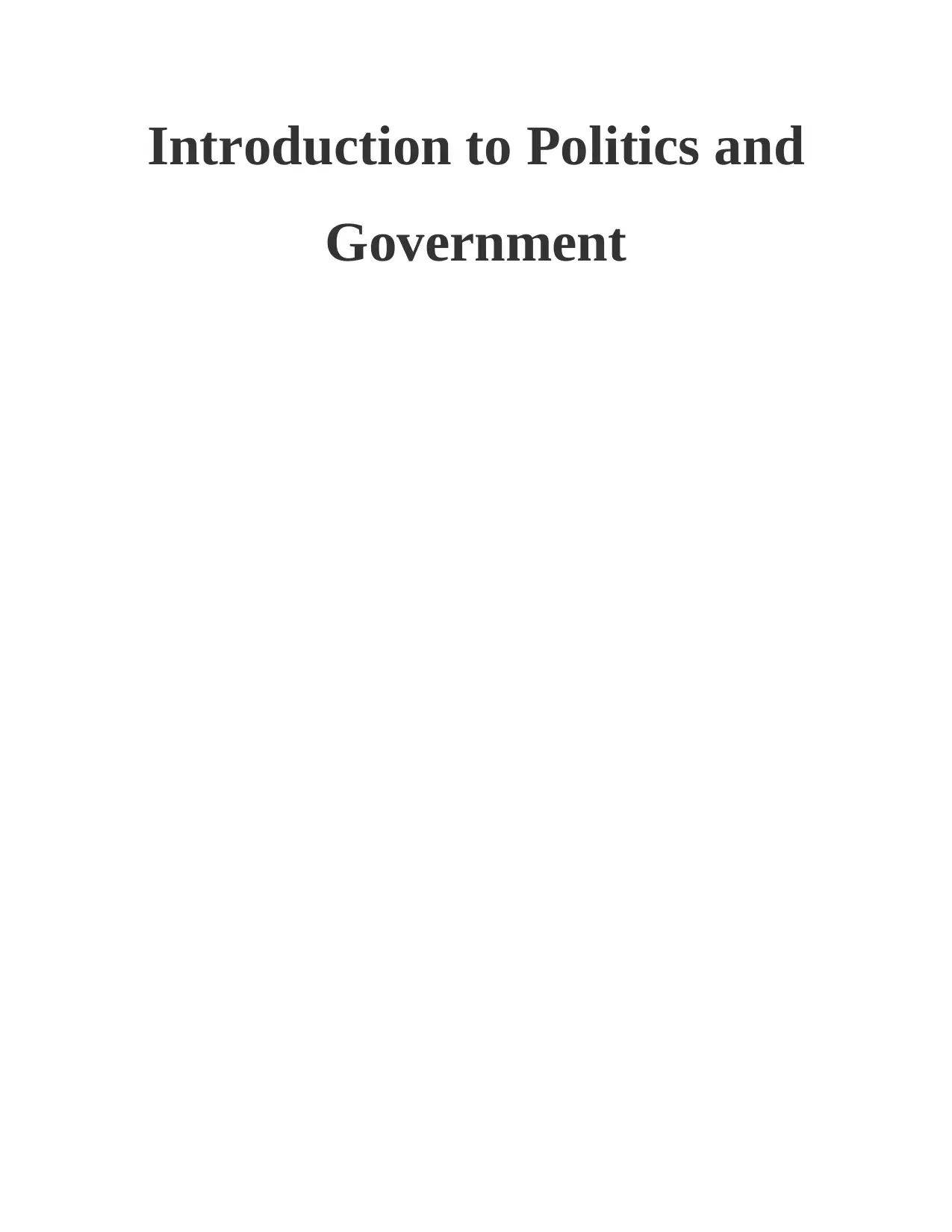
Introduction to Politics and
Government
Government
Paraphrase This Document
Need a fresh take? Get an instant paraphrase of this document with our AI Paraphraser
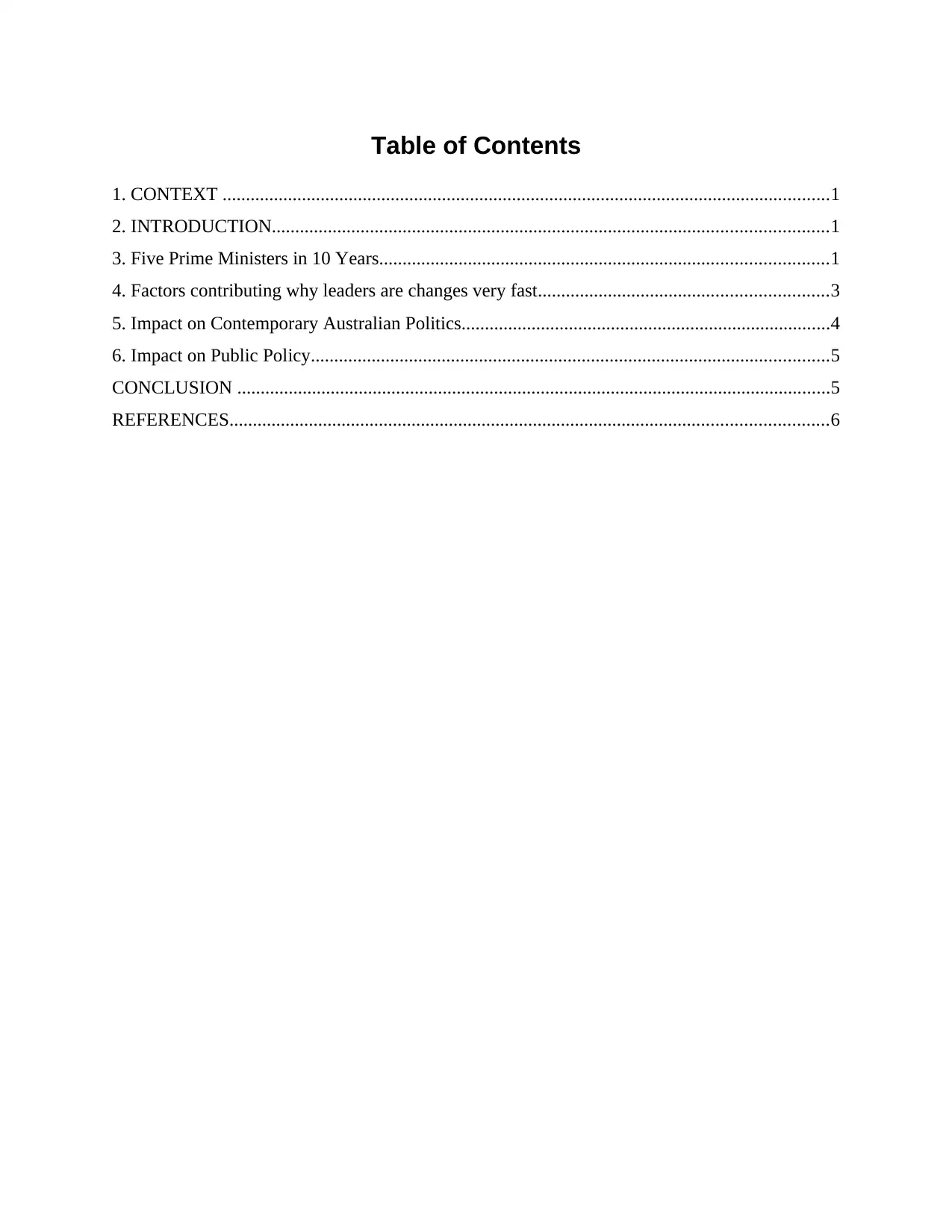
Table of Contents
1. CONTEXT ..................................................................................................................................1
2. INTRODUCTION.......................................................................................................................1
3. Five Prime Ministers in 10 Years................................................................................................1
4. Factors contributing why leaders are changes very fast..............................................................3
5. Impact on Contemporary Australian Politics...............................................................................4
6. Impact on Public Policy...............................................................................................................5
CONCLUSION ...............................................................................................................................5
REFERENCES................................................................................................................................6
1. CONTEXT ..................................................................................................................................1
2. INTRODUCTION.......................................................................................................................1
3. Five Prime Ministers in 10 Years................................................................................................1
4. Factors contributing why leaders are changes very fast..............................................................3
5. Impact on Contemporary Australian Politics...............................................................................4
6. Impact on Public Policy...............................................................................................................5
CONCLUSION ...............................................................................................................................5
REFERENCES................................................................................................................................6
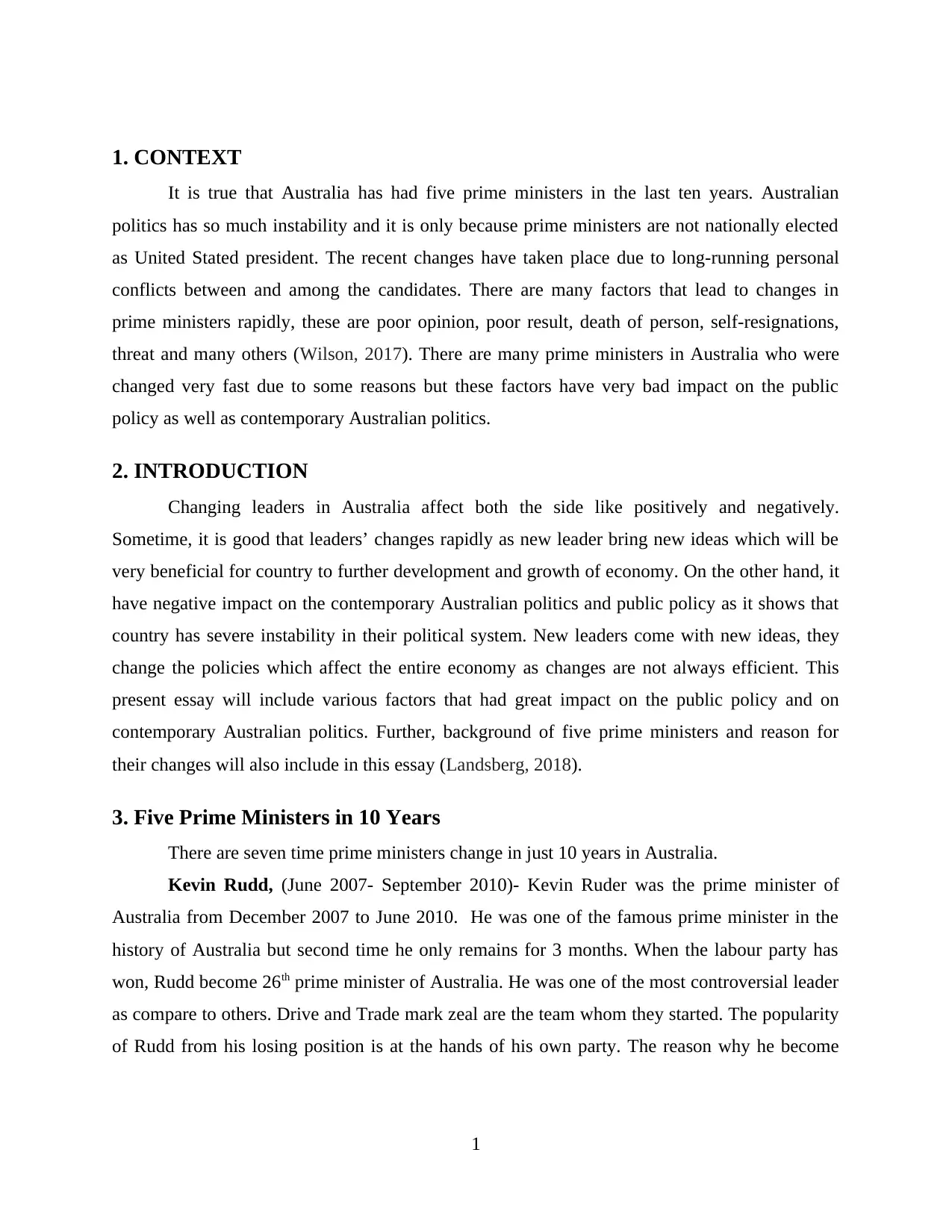
1. CONTEXT
It is true that Australia has had five prime ministers in the last ten years. Australian
politics has so much instability and it is only because prime ministers are not nationally elected
as United Stated president. The recent changes have taken place due to long-running personal
conflicts between and among the candidates. There are many factors that lead to changes in
prime ministers rapidly, these are poor opinion, poor result, death of person, self-resignations,
threat and many others (Wilson, 2017). There are many prime ministers in Australia who were
changed very fast due to some reasons but these factors have very bad impact on the public
policy as well as contemporary Australian politics.
2. INTRODUCTION
Changing leaders in Australia affect both the side like positively and negatively.
Sometime, it is good that leaders’ changes rapidly as new leader bring new ideas which will be
very beneficial for country to further development and growth of economy. On the other hand, it
have negative impact on the contemporary Australian politics and public policy as it shows that
country has severe instability in their political system. New leaders come with new ideas, they
change the policies which affect the entire economy as changes are not always efficient. This
present essay will include various factors that had great impact on the public policy and on
contemporary Australian politics. Further, background of five prime ministers and reason for
their changes will also include in this essay (Landsberg, 2018).
3. Five Prime Ministers in 10 Years
There are seven time prime ministers change in just 10 years in Australia.
Kevin Rudd, (June 2007- September 2010)- Kevin Ruder was the prime minister of
Australia from December 2007 to June 2010. He was one of the famous prime minister in the
history of Australia but second time he only remains for 3 months. When the labour party has
won, Rudd become 26th prime minister of Australia. He was one of the most controversial leader
as compare to others. Drive and Trade mark zeal are the team whom they started. The popularity
of Rudd from his losing position is at the hands of his own party. The reason why he become
1
It is true that Australia has had five prime ministers in the last ten years. Australian
politics has so much instability and it is only because prime ministers are not nationally elected
as United Stated president. The recent changes have taken place due to long-running personal
conflicts between and among the candidates. There are many factors that lead to changes in
prime ministers rapidly, these are poor opinion, poor result, death of person, self-resignations,
threat and many others (Wilson, 2017). There are many prime ministers in Australia who were
changed very fast due to some reasons but these factors have very bad impact on the public
policy as well as contemporary Australian politics.
2. INTRODUCTION
Changing leaders in Australia affect both the side like positively and negatively.
Sometime, it is good that leaders’ changes rapidly as new leader bring new ideas which will be
very beneficial for country to further development and growth of economy. On the other hand, it
have negative impact on the contemporary Australian politics and public policy as it shows that
country has severe instability in their political system. New leaders come with new ideas, they
change the policies which affect the entire economy as changes are not always efficient. This
present essay will include various factors that had great impact on the public policy and on
contemporary Australian politics. Further, background of five prime ministers and reason for
their changes will also include in this essay (Landsberg, 2018).
3. Five Prime Ministers in 10 Years
There are seven time prime ministers change in just 10 years in Australia.
Kevin Rudd, (June 2007- September 2010)- Kevin Ruder was the prime minister of
Australia from December 2007 to June 2010. He was one of the famous prime minister in the
history of Australia but second time he only remains for 3 months. When the labour party has
won, Rudd become 26th prime minister of Australia. He was one of the most controversial leader
as compare to others. Drive and Trade mark zeal are the team whom they started. The popularity
of Rudd from his losing position is at the hands of his own party. The reason why he become
1
⊘ This is a preview!⊘
Do you want full access?
Subscribe today to unlock all pages.

Trusted by 1+ million students worldwide
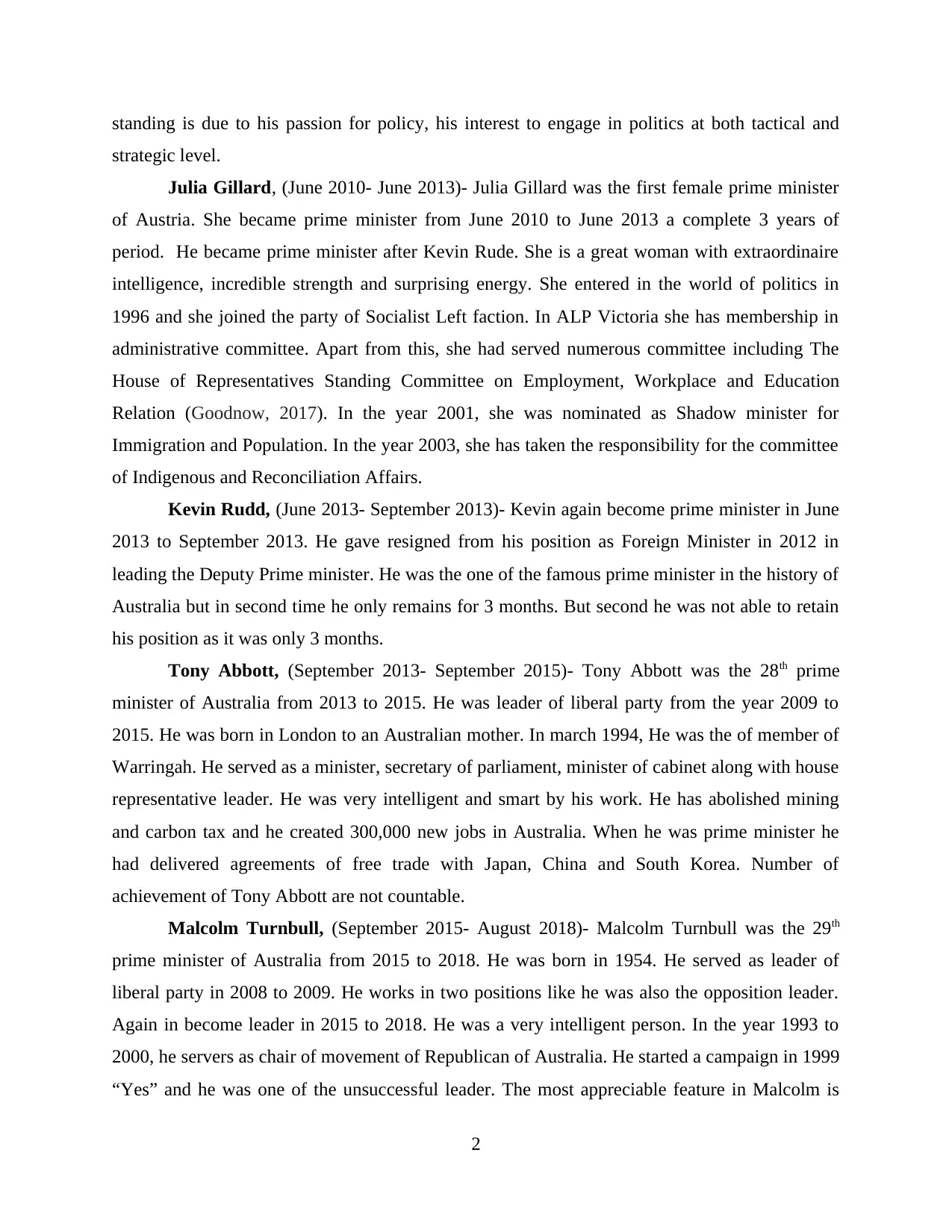
standing is due to his passion for policy, his interest to engage in politics at both tactical and
strategic level.
Julia Gillard, (June 2010- June 2013)- Julia Gillard was the first female prime minister
of Austria. She became prime minister from June 2010 to June 2013 a complete 3 years of
period. He became prime minister after Kevin Rude. She is a great woman with extraordinaire
intelligence, incredible strength and surprising energy. She entered in the world of politics in
1996 and she joined the party of Socialist Left faction. In ALP Victoria she has membership in
administrative committee. Apart from this, she had served numerous committee including The
House of Representatives Standing Committee on Employment, Workplace and Education
Relation (Goodnow, 2017). In the year 2001, she was nominated as Shadow minister for
Immigration and Population. In the year 2003, she has taken the responsibility for the committee
of Indigenous and Reconciliation Affairs.
Kevin Rudd, (June 2013- September 2013)- Kevin again become prime minister in June
2013 to September 2013. He gave resigned from his position as Foreign Minister in 2012 in
leading the Deputy Prime minister. He was the one of the famous prime minister in the history of
Australia but in second time he only remains for 3 months. But second he was not able to retain
his position as it was only 3 months.
Tony Abbott, (September 2013- September 2015)- Tony Abbott was the 28th prime
minister of Australia from 2013 to 2015. He was leader of liberal party from the year 2009 to
2015. He was born in London to an Australian mother. In march 1994, He was the of member of
Warringah. He served as a minister, secretary of parliament, minister of cabinet along with house
representative leader. He was very intelligent and smart by his work. He has abolished mining
and carbon tax and he created 300,000 new jobs in Australia. When he was prime minister he
had delivered agreements of free trade with Japan, China and South Korea. Number of
achievement of Tony Abbott are not countable.
Malcolm Turnbull, (September 2015- August 2018)- Malcolm Turnbull was the 29th
prime minister of Australia from 2015 to 2018. He was born in 1954. He served as leader of
liberal party in 2008 to 2009. He works in two positions like he was also the opposition leader.
Again in become leader in 2015 to 2018. He was a very intelligent person. In the year 1993 to
2000, he servers as chair of movement of Republican of Australia. He started a campaign in 1999
“Yes” and he was one of the unsuccessful leader. The most appreciable feature in Malcolm is
2
strategic level.
Julia Gillard, (June 2010- June 2013)- Julia Gillard was the first female prime minister
of Austria. She became prime minister from June 2010 to June 2013 a complete 3 years of
period. He became prime minister after Kevin Rude. She is a great woman with extraordinaire
intelligence, incredible strength and surprising energy. She entered in the world of politics in
1996 and she joined the party of Socialist Left faction. In ALP Victoria she has membership in
administrative committee. Apart from this, she had served numerous committee including The
House of Representatives Standing Committee on Employment, Workplace and Education
Relation (Goodnow, 2017). In the year 2001, she was nominated as Shadow minister for
Immigration and Population. In the year 2003, she has taken the responsibility for the committee
of Indigenous and Reconciliation Affairs.
Kevin Rudd, (June 2013- September 2013)- Kevin again become prime minister in June
2013 to September 2013. He gave resigned from his position as Foreign Minister in 2012 in
leading the Deputy Prime minister. He was the one of the famous prime minister in the history of
Australia but in second time he only remains for 3 months. But second he was not able to retain
his position as it was only 3 months.
Tony Abbott, (September 2013- September 2015)- Tony Abbott was the 28th prime
minister of Australia from 2013 to 2015. He was leader of liberal party from the year 2009 to
2015. He was born in London to an Australian mother. In march 1994, He was the of member of
Warringah. He served as a minister, secretary of parliament, minister of cabinet along with house
representative leader. He was very intelligent and smart by his work. He has abolished mining
and carbon tax and he created 300,000 new jobs in Australia. When he was prime minister he
had delivered agreements of free trade with Japan, China and South Korea. Number of
achievement of Tony Abbott are not countable.
Malcolm Turnbull, (September 2015- August 2018)- Malcolm Turnbull was the 29th
prime minister of Australia from 2015 to 2018. He was born in 1954. He served as leader of
liberal party in 2008 to 2009. He works in two positions like he was also the opposition leader.
Again in become leader in 2015 to 2018. He was a very intelligent person. In the year 1993 to
2000, he servers as chair of movement of Republican of Australia. He started a campaign in 1999
“Yes” and he was one of the unsuccessful leader. The most appreciable feature in Malcolm is
2
Paraphrase This Document
Need a fresh take? Get an instant paraphrase of this document with our AI Paraphraser
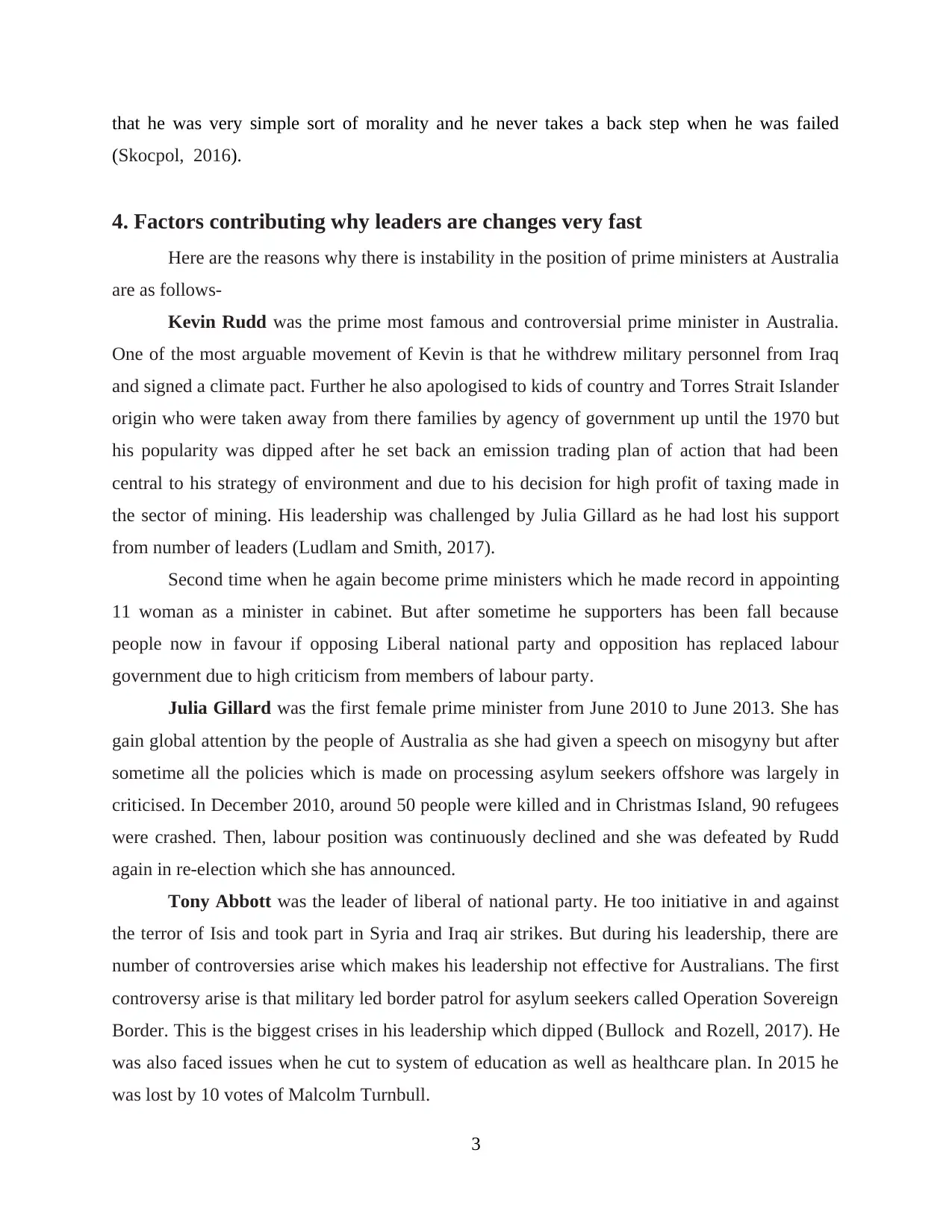
that he was very simple sort of morality and he never takes a back step when he was failed
(Skocpol, 2016).
4. Factors contributing why leaders are changes very fast
Here are the reasons why there is instability in the position of prime ministers at Australia
are as follows-
Kevin Rudd was the prime most famous and controversial prime minister in Australia.
One of the most arguable movement of Kevin is that he withdrew military personnel from Iraq
and signed a climate pact. Further he also apologised to kids of country and Torres Strait Islander
origin who were taken away from there families by agency of government up until the 1970 but
his popularity was dipped after he set back an emission trading plan of action that had been
central to his strategy of environment and due to his decision for high profit of taxing made in
the sector of mining. His leadership was challenged by Julia Gillard as he had lost his support
from number of leaders (Ludlam and Smith, 2017).
Second time when he again become prime ministers which he made record in appointing
11 woman as a minister in cabinet. But after sometime he supporters has been fall because
people now in favour if opposing Liberal national party and opposition has replaced labour
government due to high criticism from members of labour party.
Julia Gillard was the first female prime minister from June 2010 to June 2013. She has
gain global attention by the people of Australia as she had given a speech on misogyny but after
sometime all the policies which is made on processing asylum seekers offshore was largely in
criticised. In December 2010, around 50 people were killed and in Christmas Island, 90 refugees
were crashed. Then, labour position was continuously declined and she was defeated by Rudd
again in re-election which she has announced.
Tony Abbott was the leader of liberal of national party. He too initiative in and against
the terror of Isis and took part in Syria and Iraq air strikes. But during his leadership, there are
number of controversies arise which makes his leadership not effective for Australians. The first
controversy arise is that military led border patrol for asylum seekers called Operation Sovereign
Border. This is the biggest crises in his leadership which dipped (Bullock and Rozell, 2017). He
was also faced issues when he cut to system of education as well as healthcare plan. In 2015 he
was lost by 10 votes of Malcolm Turnbull.
3
(Skocpol, 2016).
4. Factors contributing why leaders are changes very fast
Here are the reasons why there is instability in the position of prime ministers at Australia
are as follows-
Kevin Rudd was the prime most famous and controversial prime minister in Australia.
One of the most arguable movement of Kevin is that he withdrew military personnel from Iraq
and signed a climate pact. Further he also apologised to kids of country and Torres Strait Islander
origin who were taken away from there families by agency of government up until the 1970 but
his popularity was dipped after he set back an emission trading plan of action that had been
central to his strategy of environment and due to his decision for high profit of taxing made in
the sector of mining. His leadership was challenged by Julia Gillard as he had lost his support
from number of leaders (Ludlam and Smith, 2017).
Second time when he again become prime ministers which he made record in appointing
11 woman as a minister in cabinet. But after sometime he supporters has been fall because
people now in favour if opposing Liberal national party and opposition has replaced labour
government due to high criticism from members of labour party.
Julia Gillard was the first female prime minister from June 2010 to June 2013. She has
gain global attention by the people of Australia as she had given a speech on misogyny but after
sometime all the policies which is made on processing asylum seekers offshore was largely in
criticised. In December 2010, around 50 people were killed and in Christmas Island, 90 refugees
were crashed. Then, labour position was continuously declined and she was defeated by Rudd
again in re-election which she has announced.
Tony Abbott was the leader of liberal of national party. He too initiative in and against
the terror of Isis and took part in Syria and Iraq air strikes. But during his leadership, there are
number of controversies arise which makes his leadership not effective for Australians. The first
controversy arise is that military led border patrol for asylum seekers called Operation Sovereign
Border. This is the biggest crises in his leadership which dipped (Bullock and Rozell, 2017). He
was also faced issues when he cut to system of education as well as healthcare plan. In 2015 he
was lost by 10 votes of Malcolm Turnbull.
3
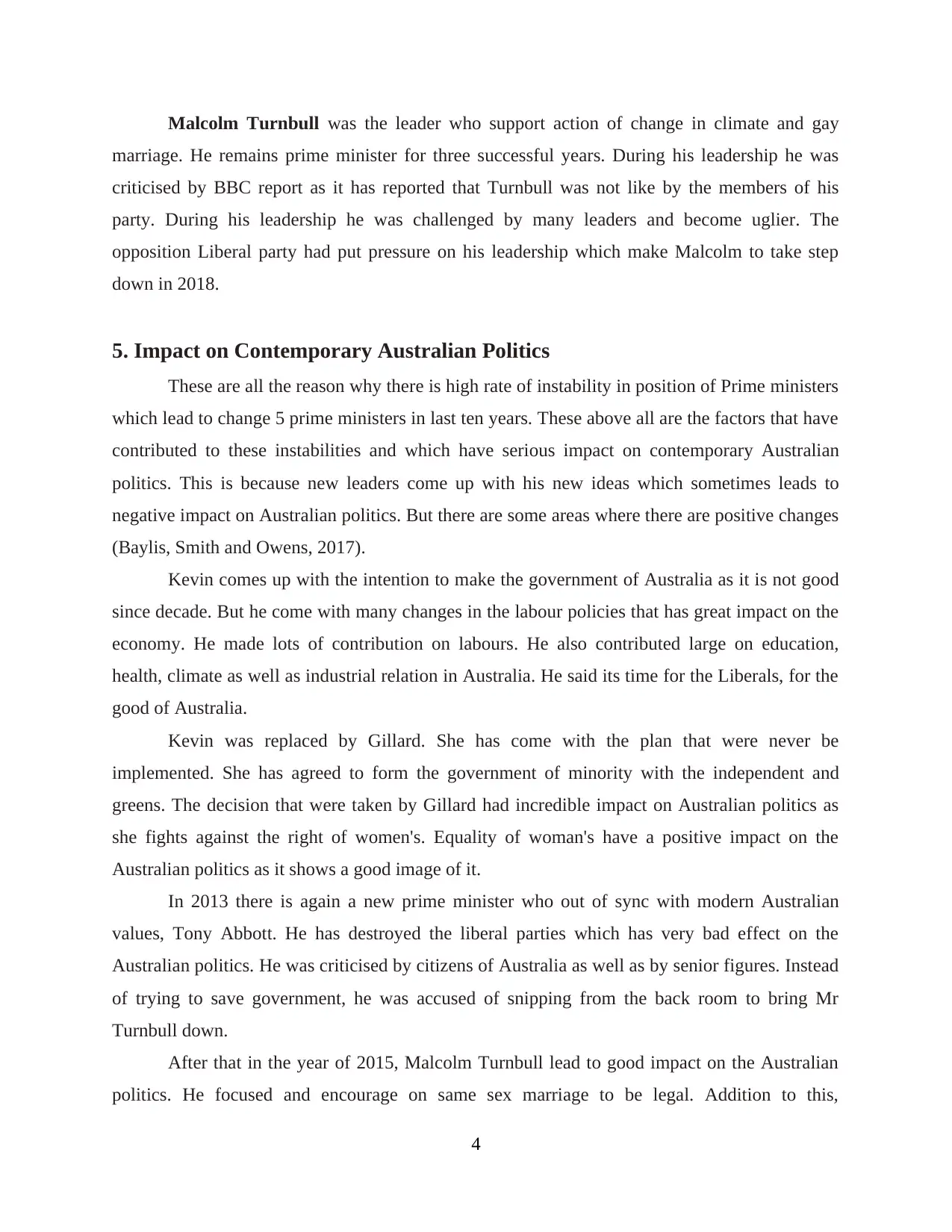
Malcolm Turnbull was the leader who support action of change in climate and gay
marriage. He remains prime minister for three successful years. During his leadership he was
criticised by BBC report as it has reported that Turnbull was not like by the members of his
party. During his leadership he was challenged by many leaders and become uglier. The
opposition Liberal party had put pressure on his leadership which make Malcolm to take step
down in 2018.
5. Impact on Contemporary Australian Politics
These are all the reason why there is high rate of instability in position of Prime ministers
which lead to change 5 prime ministers in last ten years. These above all are the factors that have
contributed to these instabilities and which have serious impact on contemporary Australian
politics. This is because new leaders come up with his new ideas which sometimes leads to
negative impact on Australian politics. But there are some areas where there are positive changes
(Baylis, Smith and Owens, 2017).
Kevin comes up with the intention to make the government of Australia as it is not good
since decade. But he come with many changes in the labour policies that has great impact on the
economy. He made lots of contribution on labours. He also contributed large on education,
health, climate as well as industrial relation in Australia. He said its time for the Liberals, for the
good of Australia.
Kevin was replaced by Gillard. She has come with the plan that were never be
implemented. She has agreed to form the government of minority with the independent and
greens. The decision that were taken by Gillard had incredible impact on Australian politics as
she fights against the right of women's. Equality of woman's have a positive impact on the
Australian politics as it shows a good image of it.
In 2013 there is again a new prime minister who out of sync with modern Australian
values, Tony Abbott. He has destroyed the liberal parties which has very bad effect on the
Australian politics. He was criticised by citizens of Australia as well as by senior figures. Instead
of trying to save government, he was accused of snipping from the back room to bring Mr
Turnbull down.
After that in the year of 2015, Malcolm Turnbull lead to good impact on the Australian
politics. He focused and encourage on same sex marriage to be legal. Addition to this,
4
marriage. He remains prime minister for three successful years. During his leadership he was
criticised by BBC report as it has reported that Turnbull was not like by the members of his
party. During his leadership he was challenged by many leaders and become uglier. The
opposition Liberal party had put pressure on his leadership which make Malcolm to take step
down in 2018.
5. Impact on Contemporary Australian Politics
These are all the reason why there is high rate of instability in position of Prime ministers
which lead to change 5 prime ministers in last ten years. These above all are the factors that have
contributed to these instabilities and which have serious impact on contemporary Australian
politics. This is because new leaders come up with his new ideas which sometimes leads to
negative impact on Australian politics. But there are some areas where there are positive changes
(Baylis, Smith and Owens, 2017).
Kevin comes up with the intention to make the government of Australia as it is not good
since decade. But he come with many changes in the labour policies that has great impact on the
economy. He made lots of contribution on labours. He also contributed large on education,
health, climate as well as industrial relation in Australia. He said its time for the Liberals, for the
good of Australia.
Kevin was replaced by Gillard. She has come with the plan that were never be
implemented. She has agreed to form the government of minority with the independent and
greens. The decision that were taken by Gillard had incredible impact on Australian politics as
she fights against the right of women's. Equality of woman's have a positive impact on the
Australian politics as it shows a good image of it.
In 2013 there is again a new prime minister who out of sync with modern Australian
values, Tony Abbott. He has destroyed the liberal parties which has very bad effect on the
Australian politics. He was criticised by citizens of Australia as well as by senior figures. Instead
of trying to save government, he was accused of snipping from the back room to bring Mr
Turnbull down.
After that in the year of 2015, Malcolm Turnbull lead to good impact on the Australian
politics. He focused and encourage on same sex marriage to be legal. Addition to this,
4
⊘ This is a preview!⊘
Do you want full access?
Subscribe today to unlock all pages.

Trusted by 1+ million students worldwide
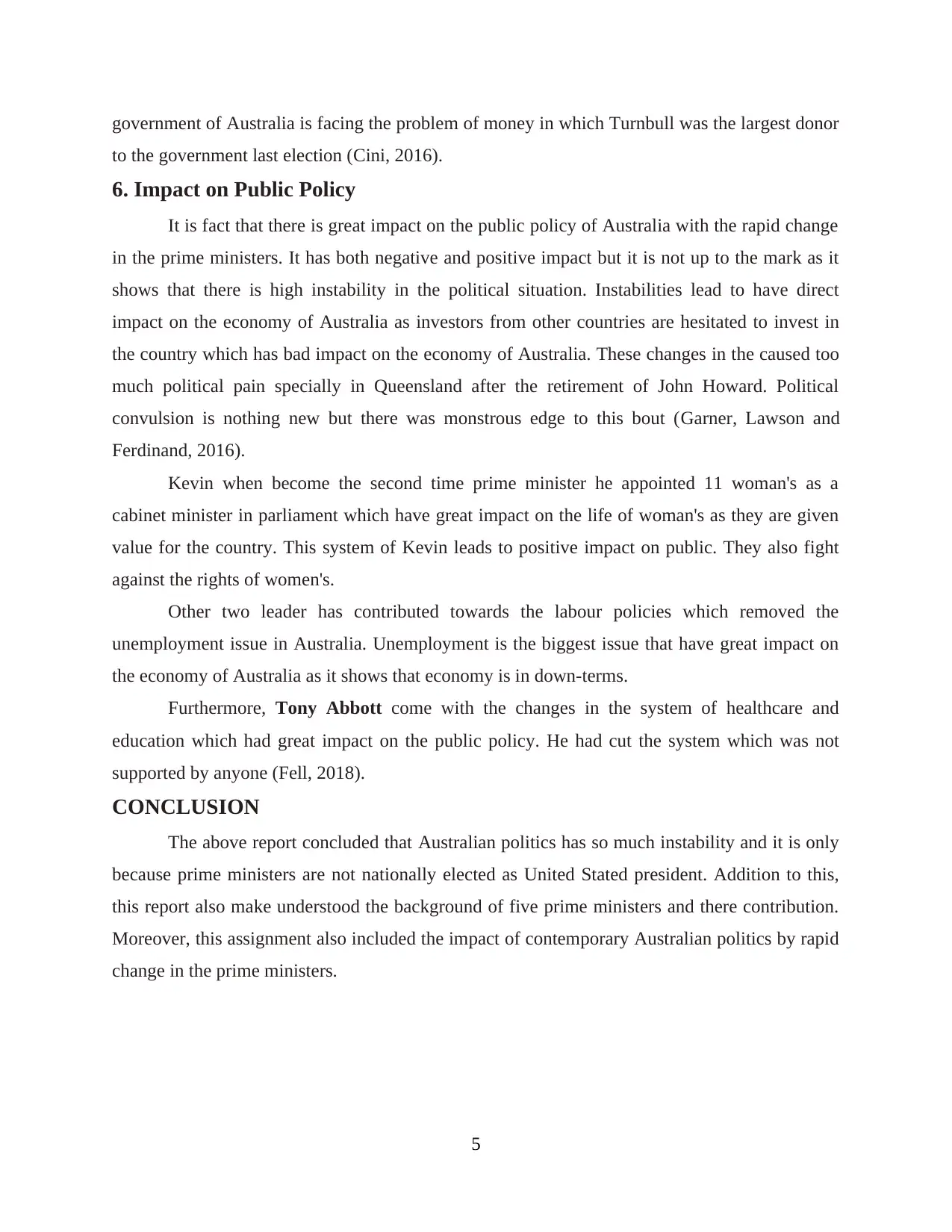
government of Australia is facing the problem of money in which Turnbull was the largest donor
to the government last election (Cini, 2016).
6. Impact on Public Policy
It is fact that there is great impact on the public policy of Australia with the rapid change
in the prime ministers. It has both negative and positive impact but it is not up to the mark as it
shows that there is high instability in the political situation. Instabilities lead to have direct
impact on the economy of Australia as investors from other countries are hesitated to invest in
the country which has bad impact on the economy of Australia. These changes in the caused too
much political pain specially in Queensland after the retirement of John Howard. Political
convulsion is nothing new but there was monstrous edge to this bout (Garner, Lawson and
Ferdinand, 2016).
Kevin when become the second time prime minister he appointed 11 woman's as a
cabinet minister in parliament which have great impact on the life of woman's as they are given
value for the country. This system of Kevin leads to positive impact on public. They also fight
against the rights of women's.
Other two leader has contributed towards the labour policies which removed the
unemployment issue in Australia. Unemployment is the biggest issue that have great impact on
the economy of Australia as it shows that economy is in down-terms.
Furthermore, Tony Abbott come with the changes in the system of healthcare and
education which had great impact on the public policy. He had cut the system which was not
supported by anyone (Fell, 2018).
CONCLUSION
The above report concluded that Australian politics has so much instability and it is only
because prime ministers are not nationally elected as United Stated president. Addition to this,
this report also make understood the background of five prime ministers and there contribution.
Moreover, this assignment also included the impact of contemporary Australian politics by rapid
change in the prime ministers.
5
to the government last election (Cini, 2016).
6. Impact on Public Policy
It is fact that there is great impact on the public policy of Australia with the rapid change
in the prime ministers. It has both negative and positive impact but it is not up to the mark as it
shows that there is high instability in the political situation. Instabilities lead to have direct
impact on the economy of Australia as investors from other countries are hesitated to invest in
the country which has bad impact on the economy of Australia. These changes in the caused too
much political pain specially in Queensland after the retirement of John Howard. Political
convulsion is nothing new but there was monstrous edge to this bout (Garner, Lawson and
Ferdinand, 2016).
Kevin when become the second time prime minister he appointed 11 woman's as a
cabinet minister in parliament which have great impact on the life of woman's as they are given
value for the country. This system of Kevin leads to positive impact on public. They also fight
against the rights of women's.
Other two leader has contributed towards the labour policies which removed the
unemployment issue in Australia. Unemployment is the biggest issue that have great impact on
the economy of Australia as it shows that economy is in down-terms.
Furthermore, Tony Abbott come with the changes in the system of healthcare and
education which had great impact on the public policy. He had cut the system which was not
supported by anyone (Fell, 2018).
CONCLUSION
The above report concluded that Australian politics has so much instability and it is only
because prime ministers are not nationally elected as United Stated president. Addition to this,
this report also make understood the background of five prime ministers and there contribution.
Moreover, this assignment also included the impact of contemporary Australian politics by rapid
change in the prime ministers.
5
Paraphrase This Document
Need a fresh take? Get an instant paraphrase of this document with our AI Paraphraser
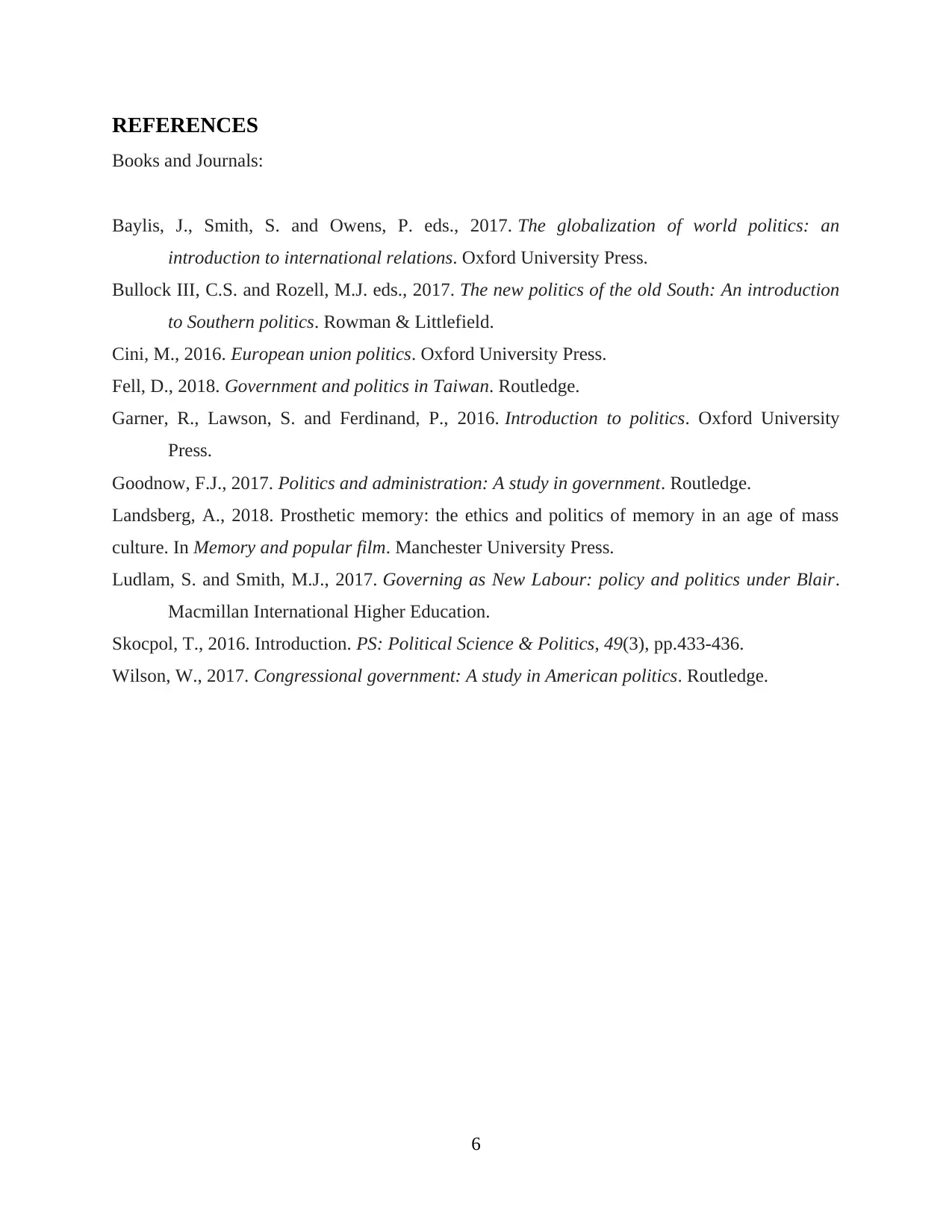
REFERENCES
Books and Journals:
Baylis, J., Smith, S. and Owens, P. eds., 2017. The globalization of world politics: an
introduction to international relations. Oxford University Press.
Bullock III, C.S. and Rozell, M.J. eds., 2017. The new politics of the old South: An introduction
to Southern politics. Rowman & Littlefield.
Cini, M., 2016. European union politics. Oxford University Press.
Fell, D., 2018. Government and politics in Taiwan. Routledge.
Garner, R., Lawson, S. and Ferdinand, P., 2016. Introduction to politics. Oxford University
Press.
Goodnow, F.J., 2017. Politics and administration: A study in government. Routledge.
Landsberg, A., 2018. Prosthetic memory: the ethics and politics of memory in an age of mass
culture. In Memory and popular film. Manchester University Press.
Ludlam, S. and Smith, M.J., 2017. Governing as New Labour: policy and politics under Blair.
Macmillan International Higher Education.
Skocpol, T., 2016. Introduction. PS: Political Science & Politics, 49(3), pp.433-436.
Wilson, W., 2017. Congressional government: A study in American politics. Routledge.
6
Books and Journals:
Baylis, J., Smith, S. and Owens, P. eds., 2017. The globalization of world politics: an
introduction to international relations. Oxford University Press.
Bullock III, C.S. and Rozell, M.J. eds., 2017. The new politics of the old South: An introduction
to Southern politics. Rowman & Littlefield.
Cini, M., 2016. European union politics. Oxford University Press.
Fell, D., 2018. Government and politics in Taiwan. Routledge.
Garner, R., Lawson, S. and Ferdinand, P., 2016. Introduction to politics. Oxford University
Press.
Goodnow, F.J., 2017. Politics and administration: A study in government. Routledge.
Landsberg, A., 2018. Prosthetic memory: the ethics and politics of memory in an age of mass
culture. In Memory and popular film. Manchester University Press.
Ludlam, S. and Smith, M.J., 2017. Governing as New Labour: policy and politics under Blair.
Macmillan International Higher Education.
Skocpol, T., 2016. Introduction. PS: Political Science & Politics, 49(3), pp.433-436.
Wilson, W., 2017. Congressional government: A study in American politics. Routledge.
6

7
⊘ This is a preview!⊘
Do you want full access?
Subscribe today to unlock all pages.

Trusted by 1+ million students worldwide
1 out of 9
Related Documents
Your All-in-One AI-Powered Toolkit for Academic Success.
+13062052269
info@desklib.com
Available 24*7 on WhatsApp / Email
![[object Object]](/_next/static/media/star-bottom.7253800d.svg)
Unlock your academic potential
Copyright © 2020–2026 A2Z Services. All Rights Reserved. Developed and managed by ZUCOL.





